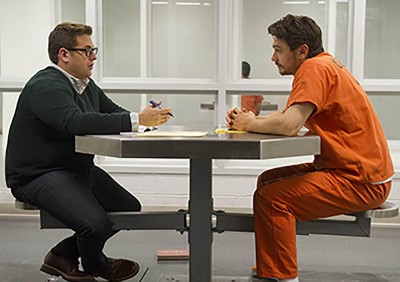
In the midst of the absolute seriousness associated with depicting a man who murdered his wife and three children, director Rupert Goold manages to add a soft color to the pale face of a labeled antagonist. In fact, that killer almost seems likeable — at least to the main narrator of “True Story,” Michael Finkel (Jonah Hill). Complexities and grey areas are strong in this intriguing film.
“True Story,” indeed based on real events, follows the case of Christian Longo (James Franco) from start to finish, opening up with a scene depicting his shameful yet intentional act of murdering his family. The case is followed up by a number of publications, but Finkel is the only journalist that gets an “in” on the story. However, he is soon faced with a complication of his own.
Booted out of his job at The New York Times Magazine for a falsity in his piece on the mistreatment of African children, Finkel leaves New York to find himself in Oregon. There, he lives with barely anything to keep himself occupied other than the occasional job-seeking phone call.
One day, he receives a call himself from an unexpected source. He picks up and discovers that the aforementioned accused murderer, Longo, has taken on his identity.
Unusually, Finkel does not hold any anger or grudge against Longo. Instead, he writes him a letter and requests a meeting in an effort to find out what caused the identity theft.
Longo informs Finkel that he has long followed the journalist’s work. He admires Finkel and would like Finkel to teach him how to write. He is even willing to provide Finkel with information about the pending case so long as Finkel agrees to not distribute their conversations to the public — at least not until the trial is finished.
Finkel agrees to this request and a friendship is formed between the most unlikely pair. Their interactions take place 15 minutes at a time in the visiting room in an Oregon prison house and beyond measurable time through letter exchanges. In examining Longo’s pencil-ridden, animated text on multiple sheets of yellow notepad paper, Finkel discovers a rather interesting fact that brings true testament to the brilliance of the film – he and Longo are not so different after all.
Aside from the occasional double negative employed by Longo, their writing mirrors one another. Real, raw scribbles and unintelligible drawings are depicted in both of their writings. But an apparent understanding of these doodles is present upon Finkel’s examination of Longo’s mini “masterpieces.” The phrase “great minds think alike” rings true as they practice their one-word free-writing exercises, revealing their thoughts to one another.
Though these exchanges between the two are stunning, they are also sporadic. Longo clearly trusts Finkel but chooses to not reveal everything to his friend immediately. It is unclear, though, whether Longo really has anything to hide. He remains a puzzle to Finkel, one that is really quite unsolvable. This makes Finkel all the more attracted to Longo’s story, so much so that he intends to collaborate with HarperCollins to write a book about him, entitled “True Story.”
Finkel’s partner, Jill (Felicity Jones), observes Finkel’s preoccupation with Longo’s case. Her reaction to this matter is quiet, and almost creepy. Though Longo is accused of stuffing two members of his family in a suitcase and drowning them, it is Jill who remains more of a mystery, but perhaps unnecessarily so. Her strange presence leaves the audience with an abundance of questions. For a character that is made to seem significant, her backstory is certainly lacking.
Admittedly, the film drags on at times, but not without suspense. Viewers are guaranteed to be on the edge of their seats, especially if they have never heard the full story of Michael Finkel and Christian Longo. The end of the trial, on the other hand, closes the film in a rather abrupt manner. But of course, that would be the case for such a film that churns out unexpected turns of events one after the other.
























































































































